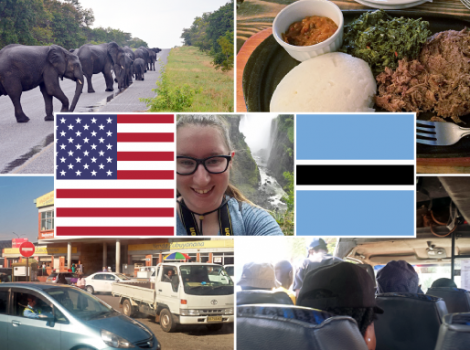I think it’s safe to say that since the global financial crisis, we’ve all experienced a severe lack of jobs wherever we are in the world. However, job searching in Botswana for me seems particularly hard. Unsurprisingly, in a country where the government is the main employer and the level of unemployment has risen to an all time-high in 2017, competition for all new vacancies is very tight. According to the World Bank, unemployment in Botswana currently stands at 17.8%, but it feels like a lot higher.
Here’s what I have experienced first hand, in my quest to find a job with good prospects in the last two years.
1. Empty promises
I’m not sure why this happens, but often people will offer to help, or may even offer to connect you with someone who can help you but never actually deliver on that promise. I’ve concluded that it’s because nobody wants to say ‘sorry I can’t help’. So rather than be honest, they make the situation worse by making empty promises.
2. Can I have Your CV?
If I made a £1 for every time I’ve been asked to submit my CV and been told ‘I’ll sort you out’, I wouldn’t be here writing this article, because I’d be laughing all the way to the bank. In my experience, people seem to enjoy collecting CVs with the promise of getting your foot through the door, but never actually do anything. Then when they next see you, they ask you to send it again because they ‘misplaced’ it, which is strange if you emailed it to them. So although I wouldn’t discourage you from handing out their CV, I’d also urge you not to hold your breath lest it doesn’t pan out.
3. Job Adverts
There’s no shortage of job adverts in the local papers, but because there are so many unemployed people desperate to find jobs, the competition is very tight. Each advert draws hundreds and in some cases, thousands of applications from desperate applicants.
I think because of the sheer volume of applications, prospective employers very seldom send letters of rejection. But when people speculate that the vacancies are already filled anyway, that companies advertise solely because they are bound by law to do so, it can be soul-destroying for job seekers. On the one hand, you wonder if there’s any point even trying, but on the other, you tell yourself you just never know. The whole thing leaves you in a catch-22 situation, but because you are loathe to miss out, you just soldier on for months, or years sometimes, before you get a single invitation to an interview.
4. Ten years plus experience required!
What’s more, a lot of job adverts require many years’ experience, the common one being 10 years! On top of that, they also tend to require Degree educated candidates, at the very least. So I’m not sure what demographic some of the prospective employers are looking at and if they actually get candidates who meet all the requirements. I’m guessing not always because I’ve also observed there are a lot of re-advertised vacancies.
5. Job description
Whether it’s an attempt at cost cutting or otherwise, I’ve observed some roles look suspiciously like 2-3 roles rolled into one. For instance, I’ve seen quite a few where a company seeks say a Customer Service Specialist/ Account Manager, who’s also required to do some in-depth finance duties that you would ordinarily not expect a Customer Service Specialist to have any clue about.
6. Accompanying documents
The majority of job adverts insist on all applicants submitting certified copies of their ID card, certified copies of their certificates, references and CV. Not only is it a tremendous waste of paper, all this requires money too. First off, for a country that struggles with severe water shortages, we seem oblivious to the amount of resources required to keep churning out reams of paper, including the use of huge amounts of water.
Secondly, when you consider that most applicants don’t have access to the Internet and money for transport to take them up and down preparing all the required documents; it seems very inconsiderate of companies to want all these documents right from the off. – Especially when you consider they won’t consider everyone and the fact that not every applicant will be short-listed.
It has always baffled me why companies don’t request certified documents at the interview stage, or better still when they issue a firm job offer to guard against paper waste, among others. OR go one better and request email applications. But countless companies make it clear they will not accept email applications! If anything, they might allow applicants to hand deliver applications. But they generally prefer for applications to be sent by post.
At a time when the rest of the world are going or have gone digital, Botswana remains trapped in a time warp, where somebody forgot to read the memo about the waste of paper being so passé, most parts of the world would be horrified to see how much we go through annually.
7. Recruitment agencies
Botswana has countless recruitment agencies, but I’m not sure of their efficacy in securing work for those registered with them. When I started my job searching exercise about two years ago, one of the first things I did was to register with a few, including the following:
- HRMC
- Staff Wise
- People Connections
- Premiere
- CGP Consultants
I must point out all the above-mentioned are well known and supposedly some of the best recruitment agencies. Some people have had some success with them, and that’s fantastic to know. However, I registered with each, but in the two years since, I have never been invited for an assessment test, received any alerts for suitable roles or any sort of correspondence from any of them. So while it won’t hurt to give them a try, I wouldn’t put much faith in them.
8. Internships/Part -Time or Freelance Jobs
Again, it may be because companies are cutting back on costs, but now more than ever, there are a lot of adverts for interns, freelancers and part-time staff. To be fair though, because I do a lot of remote online work and interact with all types of people the world over, this isn’t restricted to Botswana.
However, based on the situation in Botswana; people in these roles often do the same jobs as those who hold permanent and pensionable roles, yet they have to resign themselves to being interns/freelancers/ part time staff for a paltry allowance. Often the allowance is around the P1 500 mark per month (about $145). Obviously, this is far from enough to live on, especially when you consider the cost of living in Botswana.
I personally know a few people who are finding themselves going through a revolving door of internships, with no end in sight. But because as bad as it is, it’s better than nothing, they have to soldier on with hopes of one day being offered a permanent role. However, sometimes they are shown the door at the end of their contract and a new batch of ‘interns’ ushered in.
9. Nepotism
Talk of nepotism is rife where jobs are concerned. While some people struggle to secure even a single interview, others are able to go from one decent job after another. The belief is that if you’re ‘well-connected’, it’s not that hard to have your pick of ‘cushy’ jobs. If you don’t know anyone in high places, well you’re on your own and the search may have to go on for longer that you would prefer. It’s enough to give anyone a complex. But I can assure you; it’s not because you’re an unworthy candidate. You only have to ask a few people around you, and you’ll soon find out there are countless others in the same boat as you.
I don’t how true that is because I don’t know anyone who’s been able to secure a job through friends and family, but that’s the general feedback wherever you go. All I know is that just to get 1 interview is a bit like drawing blood from a stone!
10. Facebook pages
There are a few pages on Facebook that post current vacancies. However, pages like Jobs In Botswana and Botswana Job Centre don’t always post jobs. They are both under siege from a lot of spammers submitting totally unrelated posts, people marketing themselves and their products. The admin doesn’t seem bothered, as they don’t delete or block these types of posts. Once in a while, a good job does show up.
http://www.facebook.com/groups/167507316725416/
http://www.facebook.com/groups/297740076955192/
BW Jobs 4 Graduates consistently posts vacancies rounded up from local newspapers, and members freely share useful tips.
http://www.facebook.com/groups/bwjobs/
11. LinkedIn
Last but not least, this huge, global professional social network tool is a good resource for building contacts in your field and location of interest. I have personally not been able to secure a job via LinkedIn while in Botswana. I have been contacted by a couple of people who then disappeared on me after requesting to meet. I can only conclude they are not the most professional people or they just enjoy messing around with people.
Two such contacts disappeared for two years without a word, only to later resurface with ‘hopes’ of meeting and discussing working together’. Personally, I wouldn’t trust people of that caliber as far as I can throw them because if the simple act of communication is not their forté, quite frankly, I’d be wary of any discussions I had with them, let alone working with them. I just couldn’t trust that they would make good on any of their words.
However, LinkedIn has served my husband well in terms of networking, where there’s been no promise of a job or business. So for those who are looking to conduct business, it’s definitely something I’d highly recommend.
What are your views on finding work in Botswana? What has been your experience over the years? What worked and what didn’t? Please share your views with YourBotswana.
Reference: http://www.worldbank.org/en/country/botswana/overview




This article is great and useful in comparing to South America.
Excellent post. I’m dealing with some of these issues as well.
This website is so cool! Its something that is needed on the internet! Botswana should be proud.
Your thoughts are really notable, I’m going to drive many of my followers right onto your website.
OMG!!! The need for certified documents drives me crazy! Why does everything need to be certified? AND why are certified documents only valid for 3 months?
It’ѕ not my first time to pay a visit to this website, I am visiting daily to gеt nice information.
Seems like job searching in Botswana can be tricky 🙁
Brilliant post and all of it so true.